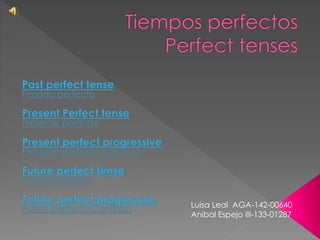
Tiempos perfectos Luisa Leal y Anibal Espejo
- 1. Luisa Leal AGA-142-00640 Anibal Espejo III-133-01287
- 2. Se utiliza para referirnos a una acción que tuvo lugar en un momento anterior a otra acción, aunque ambas hayan sucedido en el pasado estableciendo un orden entre ellas He had studied English El había estudiado Ingles I had not read something Yo no había leído algo Had She talked somebody? ¿Había hablado a alguien?
- 3. Se utiliza principalmente para hablar de acciones que ocurrieron en el pasado y tienen algún efecto en el presente. [SUJETO] + have/has + [PARTICIPIO DEL VERBO] Ellos han pasado el día en un parque. They have spent the day in a park. Ella no ha trabajado todo el día. She hasn't worked all day. ¿Ha trabajado ella todo el día? Has she worked all day?
- 4. Es una forma verbal que nos ayuda a destacar una acción que ha comenzado en el pasado y ha seguido ocurriendo hasta llegar al presente I have been studing english for 5 years Yo he estado estudiando ingles por 5 años No, I haven’t been studying for a long time. No, he hasn’t been working here for a long time. Have you been studying for a long time? Has he been working here for a long time?
- 5. Se usa para acciones o estados que habrán terminado en un momento dado en el futuro. SUJETO + SHALL/WILL + HAVE + V EN PP + COMPLEMENTO By 9 o’clock she wiIl have prepared the dinner. Para las 9 en punto ella habrá preparado la cena. He will have cleaned his desk before he leaves the office. Él habrá limpiado su escritorio antes de que él deje la oficina. We will have travelled to London by this evening. Nosotros habremos viajado a Londres para esta noche. They will have visited the museum by the time they get home. Ellos habrán visitado el museo para cuando ellos lleguen a casa. Will she have prepared the dinner by 9 o’clock? Habrá preparado ella la cena para las 9 en punto? Will he have cleaned his desk before he leaves the office? Habrá limpiado él su escritorio antes de que él deje la oficina? Will we have travelled to London by this evening? Habremos viajado nosotros a Londres para esta noche? Will they have visited the museum by the time they get home? Habrán ellos visitado el museo para cuando ellos lleguen a casa? By 9 o’clock she wiIl not have prepared the dinner. Para las 9 en punto, ella no habrá preparado la cena. Before he leaves the office, he will not have cleaned his desk. Antes de que él deje la oficina, él no habrá limpiado su escritorio. We will not have travelled to London by this evening. Nosotros no habremos viajado a Londres para esta noche. They will not have visited the museum by the time they get home. Ellos no habrán visitado el museo para cuando ellos lleguen a casa.
- 6. Se utiliza para describir acontecimientos o acciones pertenecientes a un período de tiempo entre ahora y algún momento del futuro, que puede ser incompleto S+ "WILL" + "HAVE BEEN" + V(ING)+ COMPLEMENT Jonathan will have been traveling to Panama by next week Jonathan habrá estado viajando a Panamá para la próxima semana Sara will not have been going to the beach by weekend Sara no habrá estado yendo a la playa para el fin de semana Will Jonathan have been traveling to Panama by next week? ¿Jonathan habrá estado viajando a Panamá para la próxima semana?